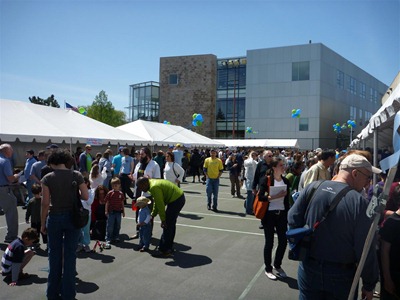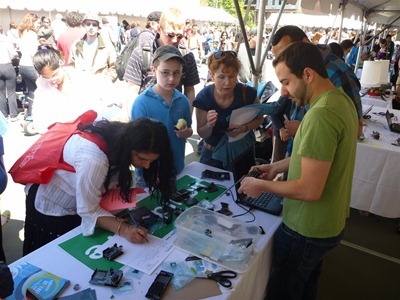Yesterday was an exciting day to be in Cambridge. On the way in, Mike and I found ourselves in the middle of a massive motorcycle ride. Getting over to Ellery St, we noticed packs of lost-looking teenagers everywhere…each diligently clutching a crimson folder in one hand. That could only mean one thing: Visitas, Harvard’s latest official term for “pre-frosh weekend”. Nevertheless, there was only one place I wanted to be on such a gorgeous Saturday afternoon…
…the tennis courts at the Cambridge Rindge and Latin School. Maker Faire Boston was one of the main attractions at the kickoff to the Cambridge Science Festival, which the MIT Museum sponsors each year.

I brought the Gravitational RC Driving by Arduino project that Chris and I did last month. With all the tents and people walking around, it wasn’t really a good idea to have the car flying around. So I had it propped up on a couple Fastenal catalogs that would let the wheels keep spinning.
It was pretty neat to see kids getting into hardware and electronics so early, though. I certainly had no idea what an accelerometer or a touchscreen was when I was 7, but it seemed like they knew exactly what it was. I call it the “iPhone effect”, where everyone has a baseline understanding and expectation of how technology interacts with them, even if they can’t quite articulate it yet.
I found myself explaining what the Arduino was and how it was useful as a way to customize and rapidly prototype hardware really easily. The Arduino/Processing language is straightforward, most shield-based hardware is modular and “soldering-optional”, and communicating with ICs over dedicated, enumerated pins makes complex development quite manageable.
Mike and I also met a lot of interesting folks who work in the burgeoning Boston biotech scene. Some recognized the Arduino, but opted for embedded hardware with a little more horsepower like Gumstix and Beagleboard to do their prototyping.
My favorite question, though, was “What’s open source hardware?”, which led to some excellent conversations starting with: “Well, I hope you have a few minutes” :)
Then Tim came by, picked up some modules and started telling his dad all about the Arduino projects. I was pretty inspired and almost asked him to take my spot at the table… Luckily, my friend Stephen came by to help out too, so I was able to wander around a bit. There were actually quite a few cool exhibits, including the guys right next to me from MITERS, who modded a shopping cart with a motor and steering wheel, and created a powerful, horn-like instrument with a couple 5-gallon buckets:
Luckily, my friend Stephen came by to help out too, so I was able to wander around a bit. There were actually quite a few cool exhibits, including the guys right next to me from MITERS, who modded a shopping cart with a motor and steering wheel, and created a powerful, horn-like instrument with a couple 5-gallon buckets:
![Maker Faire MITers[1] Maker Faire MITers[1]](http://lh3.ggpht.com/_1uSuqk4teiU/S9SwMfX5JhI/AAAAAAAAAh4/-KbtahU1Og0/Maker%20Faire%20MITers%5B1%5D%5B2%5D.jpg?imgmax=800)
Pfizer had a couple booths as well, and they were quite the hit, making ice cream with liquid nitrogen. I wasn’t able to swim through the crowds to get up front, but from where I stood it seemed pretty cool (no pun intended):
The Cambridge Mini Maker Faire turned out wonderfully, and I’ll definitely be stopping by the other events at the Cambridge Science Festival. A special thanks to Chris Connors and Ellen Bluestein for getting me set up, and everyone who volunteered and stopped by to say hi, or play with some hardware!
For the folks who were asking, everything on the table is up over at the Liquidware shop, or Modern Device. I’m looking forward to the next Maker Faire already…




No comments:
Post a Comment